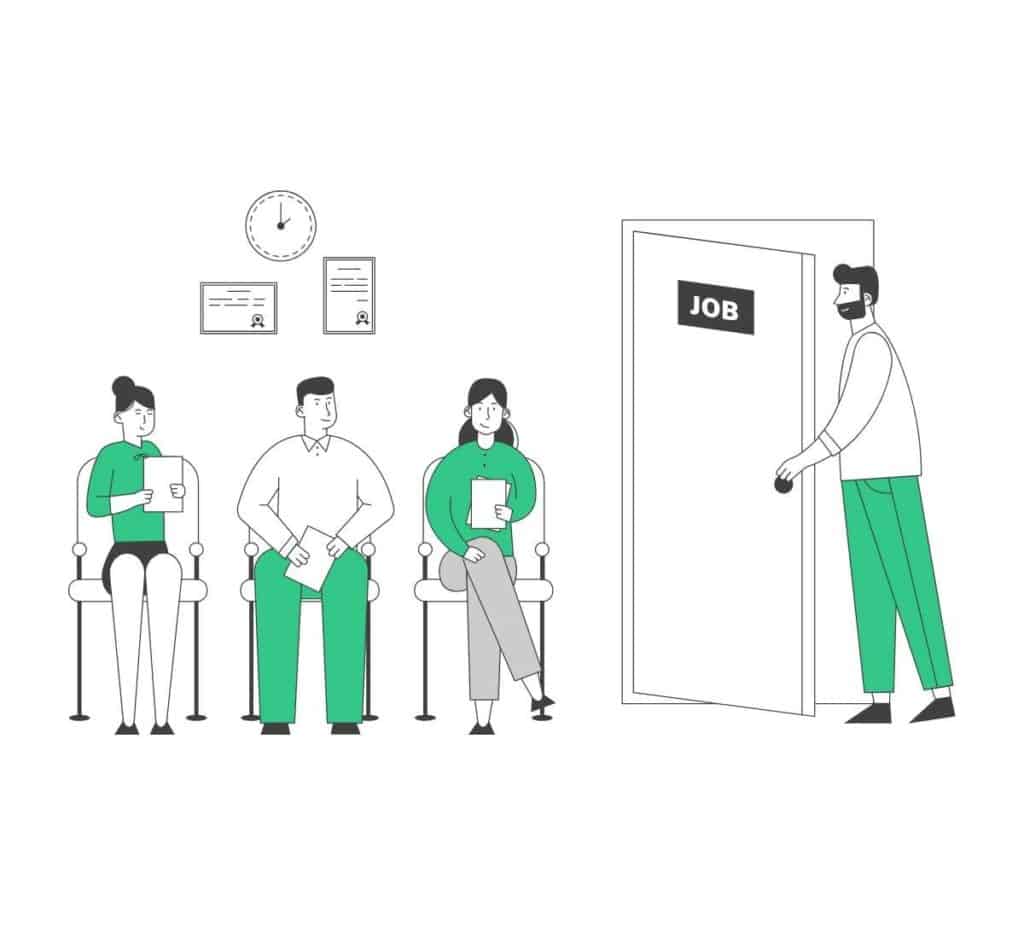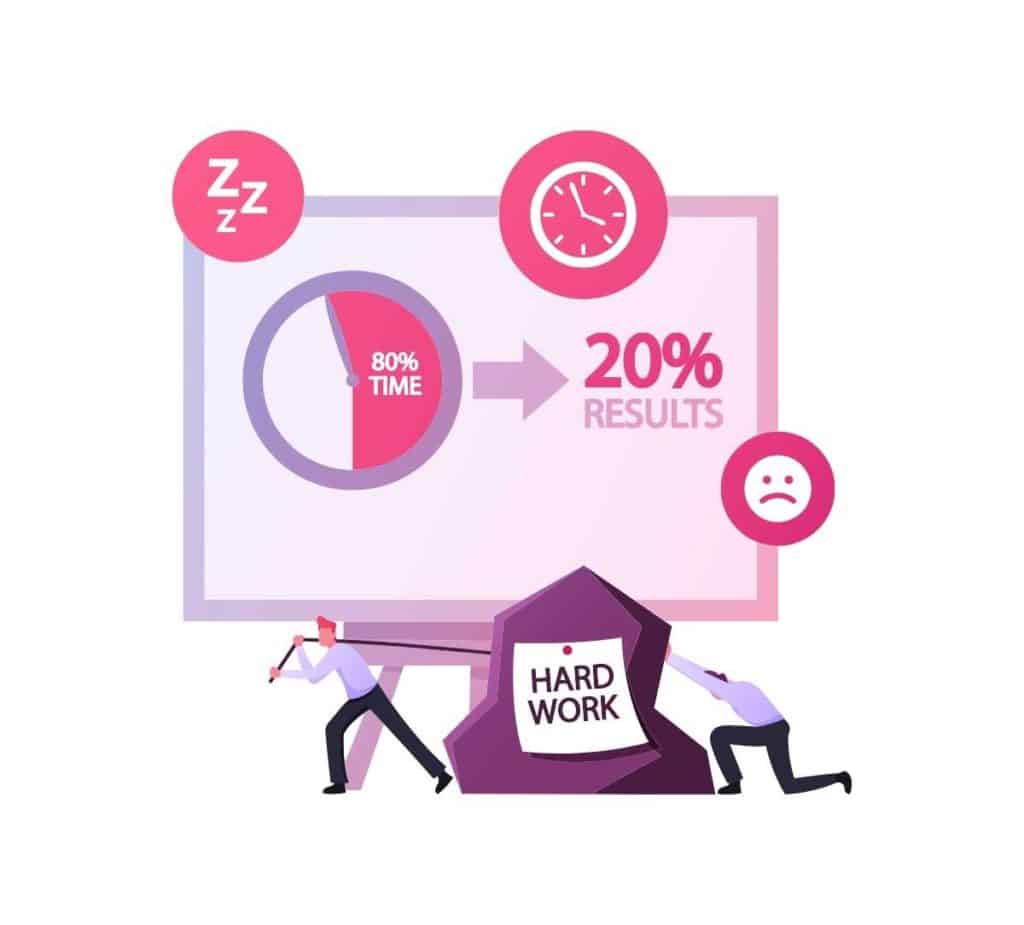
If you’re job hunting, you would either be unemployed or have a current job you’re trying to change for various reasons.
If you’re jobless, you’ll need to find a job urgently to pay your bills and cover your family’s necessities.
You could also be in a situation where you already have a job but looking for a change. Reasons for change could be many, the most common being an unreasonable boss, no salary hike, no promotion, a tedious job, or looking for a different job role, etc.
No matter the situation, the reasons why people search for jobs are strong, but why is it that people hate job searching?
People hate job searching because finding a job can be frustrating and stressful and could take time, effort, and hard work. While job hunting, people have to face their fears, deal with uncertainties and rejections and could feel like imposters when they apply for jobs without indicated work experience.
You’re not alone if you find yourself in a similar situation and hate job searching.
Most job seekers feel the same, and in this article, we’ll explore the various reasons why you might hate job searching and tips to overcome this.
Job Searching Can Be Frustrating & Stressful

Time is not on your side when you’re unemployed and searching for a job. It would help if you urgently had a job to bring food to the table and cover your family’s expenses.
But, you’re forced to play the waiting game because the job offer process takes time from applying for a job to shortlisting to multiple rounds of interviews to final selection.
Uncertainty when applying for jobs creates an enormous amount of stress, and you might start to doubt your capability.
And if you’re in a situation where you already have a job but looking for a change. You could be dealing with an overbearing boss or stuck in your current role for several years with a low salary.
Even though it may seem you have the benefit of time, you might not feel like job hunting after your daily tiring work and dealing with your demanding boss.
Once in a while, when you had your worst day in the office or when you feel like applying, you might send out a few job applications. When there’s no response, you will feel frustrated and drop the plan to search or apply for jobs.
Either way, job hunting creates stress, uncertainty, and frustrations driving people to hate the process of job searching.
Tips to Overcome
- Consistency is the key to job search. You must go all-in with your job searching and application and make this a daily routine.
- Be aware of the emotions you’ll have to deal with. Know that stress and frustration are common emotions during a job search. It’ll hit you at a particular job search stage, and you must be willing to deal with these emotions. Don’t be discouraged or abandon your job search. Keep at it, and you’ll eventually crack it.
Hate to be Assessed and Ignored by Employers

Applying for jobs can be a daunting process. And especially when it’s a recruiter’s market, where the number of jobs is less and applicants are more, every job opening has multiple applications that give recruiters the power to pick and choose a larger pool of applicants
Two things are guaranteed to happen in your job search journey.
Employers will assess you to validate if you’re suited for the job role
- Validation by Employers – Employers need to evaluate you to see if you fit their job requirements best. This is mandatory from an employer’s standpoint because they have the option to pick from a pool of applicants. For each applicant, they validate if the applicant has work experience and can handle the job role demands.
- Validation is Not a Personal Attack – Job seekers hate validation because they see it as someone validating their capabilities and comparing them with other applicants. And if they’re not selected, they take this personally and feel incapable of competing or getting a job.
Employers may ignore you, i.e., ignore your job application
There could be several reasons why an employer could ignore your job application.
- Your resume was rejected by ATS (Applicant Tracking System) – ATS is a resume auto-scanning software that matches your resume against the job description and filters out resumes with matching keywords. This could mean that your resume would not even have reached the recruiter.
- Applied for jobs with no relevant experience – When applicants apply for multiple positions, it’s possible they don’t go through the job description in detail and may apply even for irrelevant jobs using the same resume. If it reaches the recruiter, they will reject your application.
- “Unknown” Reasons – It’s also possible that your resume was rejected for “unknown” reasons. For instance, a recruiter could post a job opening for formality purposes after they’d finalized an internal/referral candidate for the position. Your resume would have been a great match, and you might have several years of relevant experience, but you’ll never know why you didn’t get the interview call or the job offer.
Tips to Overcome
- Prepare for the Interview – Getting validated by a recruiter is only part of the process, and you’ll need to be willing to put yourself in the hot seat. Be prepared to the best of your ability, and don’t take things personally. Consider this a fantastic learning opportunity for your growth.
- Create an ATS-compliant resume – Since most of the pre-screening is done by automated software programs, it’s crucial to understand how ATS scans your resume and prepares your resume to comply with the system.
- Apply selectively for relevant jobs – Don’t be tempted to apply for all the job openings you come across. Be selective and tailor your resume to match the job description very closely, do an ATS scan, and create a customized cover letter for each application. Remember: “Quality over Quantity”
Forced to Show Excitement for the Job

You might have probably heard that if you need a job offer, you must show the hiring manager you have enthusiasm and passion for the role and company. This process starts from the application (where you show enthusiasm in the cover letter) to interviews (where you show enthusiasm in person or through phone/video calls).
An applicant might be passionate and enthusiastic about the company and the job, but based on their personality type, they might not be very expressive.
In order to prove to the hiring manager that you are excited about the job role, one has to fake enthusiasm.
And there could also be instances where you’re not enthusiastic about the company or the job, but you need a job to pay the bills. It’s pretty reasonable why job seekers hate job searching because it involves faking enthusiasm.
Tips to Overcome
- Create a Cover Letter Template – For showing enthusiasm in cover letters, create a standard template that you could modify and use for multiple job applications.
- Research the company before the interview – For interviews, the best approach is to do thorough research on the company based on available materials online and form a mental picture of how your contributions to the job role can enhance company prospects.
Putting in Enormous Time & Effort for Job Hunting

Job hunting is hard work, a lot of hard work! It’s a fact, and there are no shortcuts.
If you haven’t updated your resume for several years, it could take you significant time to prepare an updated resume.
Once you start job hunting, applying for jobs takes consistent daily effort. Typically, you’ll be doing the below-listed tasks daily for a few hours:
- Search for relevant job openings
- Read through the job descriptions and decide if it matches your profile and if you’re interested.
- Create a customized resume version for the selected job opening
- Do an ATS Scan for compliance
- Create a customized cover letter for the job position.
- Send out the application
- Update your job application tracker.
- Set reminders to follow up after a few days if there is no response.
Tips to Overcome
- Internal Referrals via your Network – If you have a network of friends who could help you with referrals and job openings available when you’re looking for a job, it’s a better approach. But the timing has to be correct; you could do this alongside your daily job search and application.
- No shortcut to hard work – Unfortunately, there’s no shortcut to hard work. Be assured that doing consistent work now will allow you to reap benefits in the future.
Forced to Show Years of Relevant Work Experience

One of the most frustrating things about looking for a job is that even entry-level positions ask for 2-3 years of work experience. Entry-level should ideally be just that – “entry-level” requiring no experience.
Even for experienced people, who wish to switch roles or careers, this could be quite limiting and frustrating.
For instance, if you’re a Developer in the Computer Software industry, you could still be handling multiple roles like Business Analyst or Project Manager. But when you’re looking for a job change, job title matters, and even if you have got the relevant experience, your resume could get rejected because of your current job title.
Tips to Overcome
- Apply for the job position– Employers ask for work experience because they have the option to select from a large pool of applicants, and it’s the easiest way to reduce the number of applicants. Apply for the job anyway because you never know how many applicants compete for that job opening.
- Show relevant work experience– If you’re applying for entry-level jobs, include your personal projects and portfolio or relevant volunteering experience which could be suitable for the role. If you are experienced and think you can do the job, try updating your job title to make it broader so that it does not limit you to a specific role.
Wait Indefinitely for a Response From Employers

Companies have a large pool of job applicants and have the option not to respond back to job applicants. This could be pretty frustrating to job seekers when they’ve put in the time and effort to study the job description and send customized resumes and cover letters.
Tips to Overcome
- Follow-up – Keep track of all the job applications you’ve sent out. If there’s no response after a week, sending a follow-up email or phone to see if your application was received is perfectly ok. Similarly, if you’ve attended interviews and there’s no response, wait for a week or until the time given by the recruiter before you follow up with the recruiter.
Too Many Rejections When Applying for Jobs

One of the most dreaded fears for job seekers is the “Fear of Rejection.” Rejection is part of the process, and for every job opening posted, employers receive several job applications. One applicant gets selected, and the rest have to get rejected.
The problem is that job applicants tend to take this personally, which could hurt their confidence. Rejection is not a validation of your skills or employability; it’s just a selection process for recruiters to fill the job role.
Tips to Overcome
- Keep Going- Be aware that rejection from employers is quite normal, and they can afford to do that because of the large pool of applicants. Your skills are valuable, and there’s no reason to take any of this personally. You could have got rejected because you were over-qualified, and the recruiter couldn’t afford you for that entry-level role. You’ll never know!
Feel Like Imposters When Applying for Jobs

Imposter syndrome is real, and it’s the feeling that job applicants feel they’re not qualified to apply for the job or don’t deserve that role.
It’s the dreaded feeling that keeps many qualified employees tied to their current toxic jobs and fears moving to other jobs because they feel they lack the qualifications for that role.
Tips to Overcome
- Accept that being imperfect is ok– Many people who fear being imposters tend to go into perfectionism mode just to prove to themselves that they’re not a fraud. But instead, practice accepting that everyone is imperfect (including you), and that’s ok.
Hate Seeing Less-Qualified People Getting Jobs They Aspire

Unfairness in the job market is quite common. You could occasionally see your less qualified colleagues getting promotions and key roles, while you could get ignored even if you’re much better qualified and experienced to handle the role.
The case is similar during the job hunt as well. Less qualified applicants who are able to present themselves well and show enthusiasm for the position could grab the job offer, which could let down qualified job seekers who had applied for the same role.
Tips to Overcome
- Be well prepared for Job Interviews – A job interview is your opportunity to showcase your skills, qualification, experience, and your passion for the job role. Prepare well because that’s the only thing in your control. If you’re not selected, be happy that you gave it your best shot and move on to the next one.
Fear of The Unknown – Your Future Boss Could be a Nightmare

There’s a common adage, “We don’t quit jobs; we quit bosses.” If you’re lucky to have a boss in your current job, that could become a disadvantage when looking for a job change – the fear of ending up with a bad boss in your next job could discourage you from continuing your job search.
Having a bad boss in your current job can be an advantage because that could immensely motivate you to persist in your job search efforts.
Tips to Overcome
- Good boss vs. Bad Boss doesn’t matter – Fear of ending up with a bad boss in your next job should not stop you from job searching because it’s out of your control. Be in control of only those things which you can control. If your next boss is a bad one, learn from the new job experience of handling a bad boss, and move on to the next job. Don’t fret!
Hate the Lack Of Control

When you’re applying for jobs, you are dealing with uncertainties. Nothing much is under your control except the number of hours you can spend days searching for jobs and applying for the positions.
The economic conditions, job market, number of daily job postings matching your resume, the response from recruiters, interview calls, number of applicants for a job opening, and getting the job offers – none of these are in the job applicant’s control.
Tips to Overcome
- Be in control of only those activities that you can control. The only thing in your control is your consistent daily efforts for job searching, applying for jobs, and interview preparation. The rest are not in your control, so let go of these and focus on the ones where you could make a difference.
Require Hard Work – Exhausted After Current Work

There’s no doubt that searching for jobs daily, scanning through job descriptions, and consistently creating customized resumes and cover letters is a lot of hard work.
And in addition to this, applicants would face rejections and get ignored by recruiters, creating enormous mental barriers for job seekers to continue applying for jobs.
If you are currently employed in a job you’re trying to change, you’ll need to put in daily efforts after your exhausting day’s work.
Tips to Overcome
- Early Morning Job Search – Wake up a few hours early in the morning with a fresh mind, and put in the effort to achieve your targets. Dragging yourself to apply for jobs after your exhausting day may be exceedingly tricky.
Job Search Takes Time – Does not Happen Overnight

The average job search process could take anywhere from 3 to 6 months from application to hire, and the interview process alone could take 3 to 6 weeks.
How much time it takes for your job search could also depend on economic factors and market conditions, in addition to the amount of time and effort you invest in job search and applications.
One thing is for sure – be prepared for a prolonged job search if many applicants are competing for the same job. But with consistent efforts, you are sure to overcome the barriers and get that job offer.
Tips to Overcome
- Resilience – Be prepared for a prolonged period of job search. You could also get an offer in a few weeks, but there’s no guarantee. Keep at it consistently until you grab that offer.






